Hops in Beer Brewing: Sussex
Published: August 7, 2025 at 3:08:51 PM UTC
Beer brewing is an art that heavily relies on the quality and characteristics of its ingredients. English hops are key in defining beer's flavor and aroma. Traditional English hop varieties are cherished for their unique flavor profiles and brewing characteristics. The Sussex variety is known for its contribution to English ales' rich heritage. Using these traditional hops in modern brewing opens a world of possibilities for craft brewers. By grasping their history, flavor profile, and brewing values, brewers can craft a variety of beer styles. These styles honor traditional English ales while catering to modern tastes.
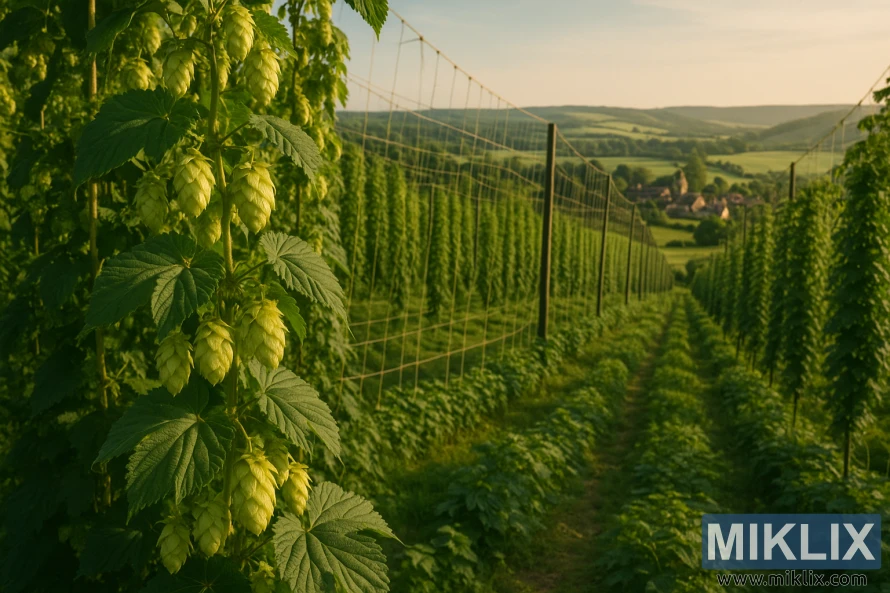
Key Takeaways
- English hops are essential for the flavor and aroma of beer.
- Traditional hop varieties offer unique brewing characteristics.
- Understanding hop characteristics is key to creating diverse beer styles.
- Craft brewers can innovate while respecting traditional brewing methods.
- The history and flavor profile of traditional hops are critical for brewing.
Understanding Sussex Hops: A Brief Introduction
In 2005, a groundbreaking discovery was made in Northiam, East Sussex. A new dwarf hop variety, known as Sussex hops, was found. This breakthrough has made Sussex hops a focus in the brewing world. They are celebrated for their unique traits and versatility in brewing a wide array of beer styles.
Sussex hops stand out due to their dwarf size. This characteristic makes them perfect for specific brewing techniques. Their compact nature facilitates more efficient cultivation and harvesting. This efficiency is a major reason for their popularity among brewers.
The art of brewing is key to unlocking the full flavor of Sussex hops. By mastering the right brewing techniques, brewers can craft beers with rich, complex flavors. Sussex hops' versatility allows them to be used in everything from traditional ales to innovative brews.
- Sussex hops offer a unique flavor profile that can enhance a variety of beer styles.
- Their dwarf variety makes them ideal for efficient cultivation and harvesting.
- Brewing techniques can be tailored to maximize the full flavor of Sussex hops.
The advent of Sussex hops in brewing has opened up new possibilities. It has not only increased the variety of hops available but also encouraged creativity in beer making. As brewers continue to explore Sussex hops, the horizon for new and exciting beer styles expands.
The Rich History of Hop Growing in Sussex
For centuries, Sussex has been celebrated for its hop production, a cornerstone in the UK's brewing legacy. The tradition of hop growing in Sussex stretches back to the 16th century. It has solidified the county's status as a leading hop-producing area in England.
The terroir of Sussex, a blend of soil and climate, has profoundly shaped its hops' flavor. This unique environment has made Sussex hops highly sought after. They are cherished for their distinct flavors, which enhance a variety of beer styles.
Hop farming in Sussex has not only boosted the local economy but also influenced the brewing industry. The region's hop growers have cultivated a variety of hop types. Each variety brings its own hop flavors, adding to the diversity of beers in England.
For brewers, understanding Sussex hops' history and characteristics is key. It allows them to use these high-quality hops in their beers. By valuing Sussex hops' rich heritage and unique qualities, brewers can craft a wide array of beer styles. These beers showcase the exceptional hop flavors Sussex is famous for.
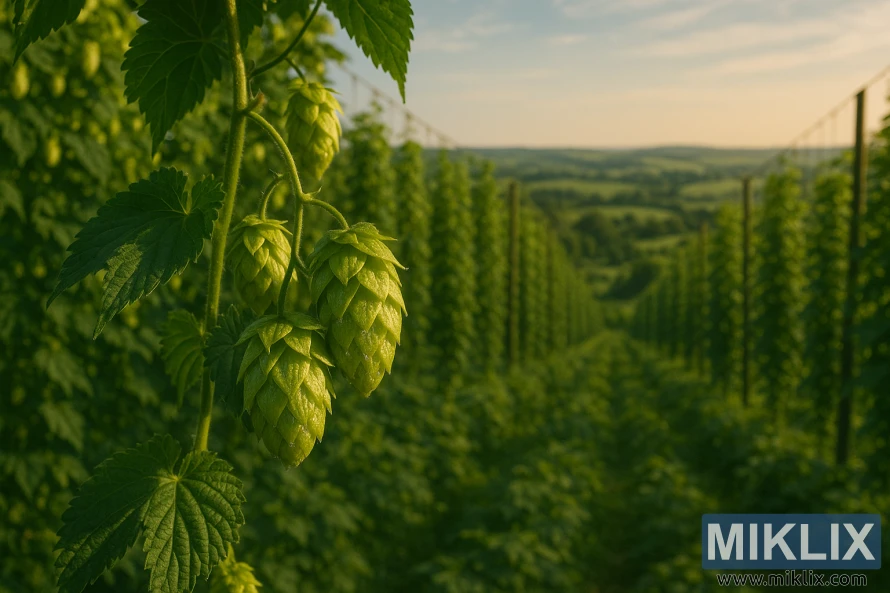
Climate and Terroir: Why Sussex Produces Exceptional Hops
The terroir of Sussex, with its chalky soils and mild climate, greatly influences its hops' distinct traits. The region's climate, a mix of warm summers and mild winters, is perfect for growing hops.
The soil in Sussex, rich in chalk, is key to the hops' flavor and aroma. It retains moisture and nutrients, enriching the hop plants' taste.
Hops from Sussex are highly sought after by brewers. They are celebrated for their balanced taste and aroma, fitting well into various beer styles.
For brewers aiming to use Sussex hops, understanding the region's terroir is vital. Recognizing the unique qualities of Sussex hops allows brewers to craft beers that highlight these exceptional hops.
Here are some brewing tips for using English hops like those from Sussex:
- Choose the right hop variety for your beer style.
- Balance the hops' bitterness and flavor.
- Try different hopping techniques to showcase the hops' unique traits.
Popular Sussex Hop Varieties
The county of Sussex is renowned for its diverse hop varieties. Each type boasts unique characteristics and brewing values. These hops are celebrated for their earthy, grassy, minty, citrus, and vanilla flavors. This versatility makes them ideal for a wide range of beer styles.
Some Sussex hop varieties are rich in alpha acids, which contribute to beer bitterness. Others are prized for their aromatic properties. These hops serve various purposes in brewing, from adding bitterness to enriching flavor and aroma.
Breweries frequently blend Sussex hop varieties with others to craft complex, unique flavors. The variety of Sussex hops empowers brewers to explore different combinations. This experimentation enhances the distinctiveness of their beers.
Understanding each Sussex hop variety's characteristics is key for brewers. It guides them in selecting the right hops for their recipes. This informed choice is essential for creating high-quality, distinctive beers.
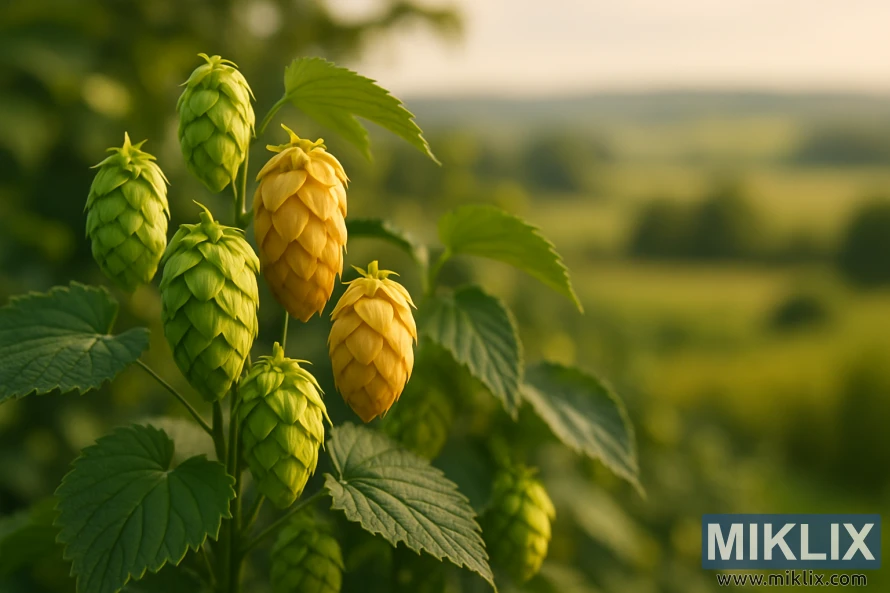
Characteristic Flavor Profiles of Sussex Hops
The flavor profiles of Sussex hops are a key factor in their popularity among craft brewers. With a moderate alpha acid level ranging from 4.3 to 5.8%, these hops offer a balanced bitterness. This complements a variety of beer styles.
Sussex hops are also known for their total oil content, which typically ranges from 0.4 to 0.6 mL/100g. This characteristic contributes to the complex aroma and flavor profiles of beers brewed with these hops.
The flavor descriptors associated with Sussex hops include earthy, floral, and slightly spicy notes. These characteristics make Sussex hops an excellent choice for brewers looking to create beers with depth and complexity.
- Earthy undertones that add depth to the beer's flavor profile
- Floral notes that contribute to a complex aroma
- Slightly spicy flavors that enhance the overall brewing experience
By understanding the characteristic flavor profiles of Sussex hops, brewers can make informed decisions about brewing techniques and hop flavors. This helps achieve the desired taste in their beers.
Best Brewing Practices with Sussex Hops
To maximize the benefits of Sussex hops, brewers must adhere to specific techniques. These methods help preserve the hops' unique characteristics. Sussex hops are best used in late boil additions, including dry hopping. This approach ensures their delicate flavor and aroma are maintained.
Several best practices can enhance the flavor profile of beers brewed with Sussex hops. These include:
- Using Sussex hops in late boil additions to preserve their volatile oils and delicate flavor compounds.
- Employing dry hopping techniques to enhance the aroma of your beers without adding bitterness.
- Selecting the right fermentation methods to complement the flavor profile of Sussex hops.
Brewing with Sussex hops can lead to a variety of beer styles, from pale ales to IPAs. The goal is to balance the hop flavor with other ingredients. This creates a harmonious taste experience.
- Pale Ales, which showcase the hop's flavor and aroma.
- IPAs, where Sussex hops add a unique twist to the traditional IPA flavor profile.
- Session Beers, where the delicate flavor of Sussex hops can be appreciated in a lower ABV context.
By following these best brewing practices and experimenting with different beer styles, brewers can unlock the full flavor of Sussex hops. This leads to the creation of unique, delicious beers.
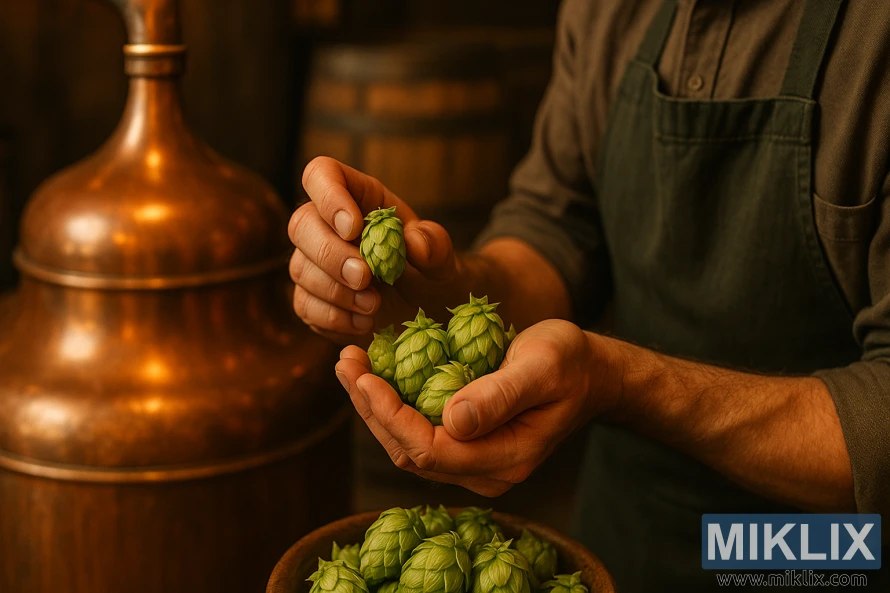
Traditional Sussex Ale Recipes
The tradition of using Sussex hops in English ale recipes is a cornerstone of brewing history. These hops are key in crafting classic styles like pale ales and bitters. They add a unique flavor and aroma to each brew.
Recipes for traditional Sussex ales often blend various hop varieties, with Sussex hops taking center stage. These recipes have been cherished for generations, each with its own special touch.
- Pale ales with a balanced blend of bitterness and flavor
- Bitters with a robust hop flavor and aroma
- Golden ales with a subtle hop character and crisp finish
These recipes highlight Sussex hops' versatility in brewing. Craft brewers can create distinctive, delicious beers by using these hops. This honors Sussex's brewing traditions.
The inclusion of English hops, like those from Sussex, in these recipes celebrates the region's brewing heritage. As craft brewing evolves, traditional Sussex ale recipes continue to inspire brewers and beer lovers.
Hop Storage and Preservation Methods
The art of preserving Sussex hops requires a blend of proper handling, storage, and packaging techniques.
It's vital to store Sussex hops in a cool, dry place, away from light and moisture. Airtight containers or vacuum-sealed packaging can help achieve this. This method keeps the hops' flavor and aroma intact.
- Store hops in a refrigerator or freezer to slow down the degradation process.
- Use oxygen barrier bags or containers to prevent oxidation.
- Keep hops away from strong-smelling foods, as they can absorb odors easily.
Proper handling is also key. Minimize exposure to air and avoid crushing or bruising the hops. This prevents a loss of flavor and aroma.
By adhering to these best practices for hop storage and preservation, brewers can ensure their Sussex hops maintain their unique flavor profiles and aroma. This results in high-quality beers.
Sourcing Authentic Sussex Hops in America
The rise in popularity of Sussex hops has opened up several avenues for American brewers to source these hops. Now, Sussex hops are available across the United States, meeting the demand from craft breweries.
Many suppliers and distributors focus on providing genuine Sussex hops to brewers in America. They ensure the hops are stored and handled correctly, maintaining their distinct flavors and aromas. Brewers should choose suppliers with direct ties to hop farms in Sussex, England, to ensure authenticity.
To guarantee the quality and authenticity of Sussex hops, brewers should verify certifications and documentation from suppliers. This includes information on hop variety, alpha acid content, and storage conditions. It's also important to understand the unique flavor profiles of Sussex hops to select the right variety for specific beer styles.
Some Sussex hop varieties are better suited for certain beer styles, improving the overall flavor and aroma. For example, the earthy and floral notes of some Sussex hops complement traditional British ales. Others might be more fitting for modern IPAs.
- Check for suppliers with direct ties to Sussex hop farms.
- Verify the certification and documentation provided.
- Understand the flavor profiles and how they match with desired beer styles.
By sourcing authentic Sussex hops and grasping their unique flavors, American brewers can craft a wide range of beer styles. These beers will showcase the distinct characteristics of these hops.
Common Brewing Challenges and Solutions
Sussex hops are celebrated for their delicate flavor and aroma. They demand careful handling to fully exploit their brewing capabilities. The main concern is preserving their subtle traits throughout the brewing process.
To tackle this issue, brewers can adopt several strategies. First, understanding the best conditions for hop storage is essential. This means keeping hops in a cool, dry place, away from light and oxygen. These factors can degrade their flavor and aroma.
Brewers also face the challenge of achieving the right flavor balance in their beer. Sussex hops have a mild, slightly sweet taste. This can be easily overshadowed by other ingredients. To solve this, brewers should choose ingredients that complement the hops' subtle flavors.
Here are some key brewing tips to overcome common challenges when using Sussex hops:
- Use Sussex hops in conjunction with other English hop varieties to create a balanced flavor profile.
- Monitor brewing temperatures closely to prevent the loss of delicate hop aromas.
- Experiment with different brewing techniques, such as dry-hopping, to maximize the hop flavor and aroma.
By understanding and addressing these common brewing challenges, brewers can unlock the full flavor of Sussex hops. This allows them to craft exceptional beers that highlight the hops' unique characteristics.
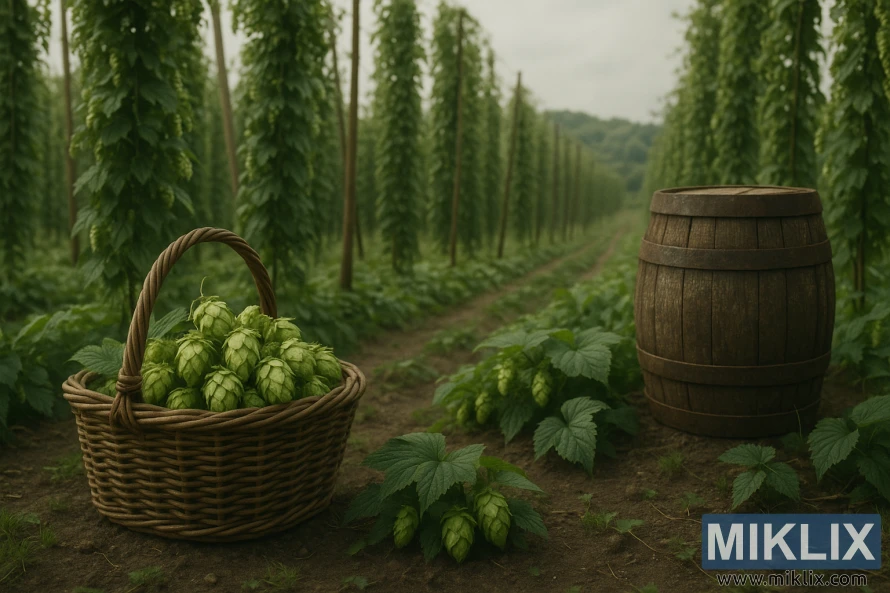
Pairing Sussex Hops with Other Varieties
Exploring the pairing of Sussex hops with other varieties can revolutionize brewing. By mixing Sussex hops with complementary types, brewers can craft beers with complex and unique flavors.
Combining Sussex hops with favorites like Cascade, Chinook, or Willamette can boost bitterness, flavor, or aroma. For example, blending Sussex hops with Cascade's citrus notes can create a refreshing pale ale.
When blending Sussex hops with others, brewers must consider alpha acid content, flavor, and aroma. This careful approach to hop blending can lead to the creation of innovative beer styles. These styles showcase the versatility of Sussex hops.
Trying out different hop combinations can help brewers craft unique beer recipes. These recipes can stand out in the craft brewing world.
Seasonal Considerations for Sussex Hop Beers
Sussex hops are a versatile ingredient for brewing beers for all seasons. Their unique characteristics make them perfect for a variety of beer styles. From refreshing summer ales to robust winter beers, Sussex hops fit the bill.
Brewers can tweak hopping rates and techniques to match the season's mood and climate. Lighter, crisper beers are great for summer. Richer, more robust beers are perfect for winter.
Here are some tips for brewing with Sussex hops for different seasons:
- Summer Beers: Use Sussex hops to create refreshing ales with citrus and floral notes.
- Autumn Beers: Sussex hops add earthy and spicy flavors to autumnal beers, fitting the harvest theme.
- Winter Beers: The robust flavors of Sussex hops enhance winter beers with warm, spicy, and woody notes.
By adjusting brewing techniques and recipes for each season, brewers can offer a diverse range of beers. Sussex hops, with their unique flavor profiles, are ideal for crafting seasonal beers that stand out.
Commercial Success Stories Using Sussex Hops
Several breweries have seen commercial success by using Sussex hops in their beers. The unique flavors and aromas of these English hops have boosted the appeal of pale ales and IPAs. This has significantly contributed to their popularity.
A well-known UK brewery experienced a notable increase in sales after introducing an IPA made with Sussex hops. The beer's success is due to its complex flavor and refreshing aroma. These are key attributes of Sussex hop varieties.
In the United States, breweries have also harnessed the appeal of Sussex hops. By adding these hops to their recipes, they've crafted unique and complex beers. These beers attract a broad range of consumers.
The success of beers with Sussex hops can be attributed to several factors:
- The distinct flavor profiles and aromas of Sussex hop varieties
- The ability to create complex and balanced beers
- The growing demand for craft beers with unique characteristics
As the demand for craft beers keeps rising, breweries will likely continue to experiment with Sussex hops. They will also explore other English hop varieties. This will help them create innovative and appealing beers.
By utilizing the unique traits of Sussex hops, breweries can stand out in a competitive market. This differentiation can lead to commercial success.
Conclusion
Sussex hops have become a key ingredient in beer brewing, known for their unique flavor and versatility. As brewers explore new techniques and ingredients, Sussex hops are set to shape the future of brewing. They offer a distinct taste that can elevate any beer.
Understanding the history, climate, and terroir of Sussex hops can open up new possibilities for brewers. Whether you're an experienced craft brewer or new to brewing, Sussex hops provide a chance to create innovative and tasty beers. They are a treasure trove for those looking to experiment with brewing techniques.
The craft brewing industry is constantly evolving, and Sussex hops are likely to play a bigger role. Their unique flavors and characteristics will undoubtedly leave a lasting mark on the world of beer brewing. They are a testament to the art and science of brewing.
Further Reading
If you enjoyed this post, you may also like these suggestions:
